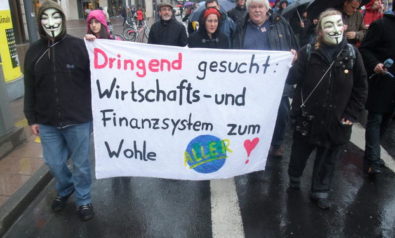Mad, passionate, love and violence – “Occupy” heads into the spring; reflections on the media coverage of the movement by Rebecca Solnit.
When you fall in love, it’s all about what you have in common, and you can hardly imagine that there are differences, let alone that you will quarrel over them, or weep about them, or be torn apart by them — or if all goes well, struggle, learn, and bond more strongly because of, rather than despite, them. The Occupy movement had its glorious honeymoon when old and young, liberal and radical, comfortable and desperate, homeless and tenured all found that what they had in common was so compelling the differences hardly seemed to matter. Until they did.
Revolutions are always like this: at first all men are brothers and anything is possible, and then, if you’re lucky, the romance of that heady moment ripens into a relationship, instead of a breakup, an abusive marriage, or a murder-suicide. Occupy had its golden age, when those who never before imagined living side-by-side with homeless people found themselves in adjoining tents in public squares.
All sorts of other equalizing forces were present, not least the police brutality that battered the privileged the way that inner-city kids are used to being battered all the time. Part of what we had in common was what we were against: the current economy and the principle of insatiable greed that made it run, as well as the emotional and economic privatization that accompanied it.
This is a system that damages people, and its devastation was on display as never before in the early months of Occupy and related phenomena like the “We are the 99%” website. When it was people facing foreclosure, or who’d lost their jobs, or were thrashing around under avalanches of college or medical debt, they weren’t hard to accept as us, and not them.
And then came the people who’d been damaged far more, the psychologically fragile, the marginal, and the homeless — some of them endlessly needy and with a huge capacity for disruption. People who had come to fight the power found themselves staying on to figure out available mental-health resources, while others who had wanted to experience a democratic society on a grand scale found themselves trying to solve sanitation problems. And then there was the violence.
The Faces of Violence
The most important direct violence Occupy faced was, of course, from the state, in the form of the police using maximum sub-lethal force on sleepers in tents, mothers with children, unarmed pedestrians, young women already penned up, unresisting seated students, poets, professors, pregnant women, wheelchair-bound occupiers, and octogenarians. It has been a sustained campaign of police brutality from Wall Street to Washington State the likes of which we haven’t seen in 40 years.
On the part of activists, there were also a few notable incidents of violence in the hundreds of camps, especially violence against women. The mainstream media seemed to think this damned the Occupy movement, though it made the camps, at worst, a whole lot like the rest of the planet, which, in case you hadn’t noticed, seethes with violence against women. But these were isolated incidents.
That old line of songster Woody Guthrie is always handy in situations like this: “Some will rob you with a six-gun, some with a fountain pen.” The police have been going after occupiers with projectile weapons, clubs, and tear gas, sending some of them to the hospital and leaving more than a few others traumatized and fearful. That’s the six-gun here.
But it all began with the fountain pens, slashing through peoples’ lives, through national and international economies, through the global markets. These were wielded by the banksters, the “vampire squid,” the deregulators in D.C., the men — and with the rarest of exceptions they were men — who stole the world.
That’s what Occupy came together to oppose, the grandest violence by scale, the least obvious by impact. No one on Wall Street ever had to get his suit besmirched by carrying out a foreclosure eviction himself. Cities provided that service for free to the banks (thereby further impoverishing themselves as they created new paupers out of old taxpayers). And the police clubbed their opponents for them, over and over, everywhere across the United States.
*[This article was originally published by TomDispatch on February 21, 2012].
The views expressed in this article are the author's own and do not necessarily reflect Fair Observer’s editorial policy.
Support Fair Observer
We rely on your support for our independence, diversity and quality.
For more than 10 years, Fair Observer has been free, fair and independent. No billionaire owns us, no advertisers control us. We are a reader-supported nonprofit. Unlike many other publications, we keep our content free for readers regardless of where they live or whether they can afford to pay. We have no paywalls and no ads.
In the post-truth era of fake news, echo chambers and filter bubbles, we publish a plurality of perspectives from around the world. Anyone can publish with us, but everyone goes through a rigorous editorial process. So, you get fact-checked, well-reasoned content instead of noise.
We publish 2,500+ voices from 90+ countries. We also conduct education and training programs
on subjects ranging from digital media and journalism to writing and critical thinking. This
doesn’t come cheap. Servers, editors, trainers and web developers cost
money.
Please consider supporting us on a regular basis as a recurring donor or a
sustaining member.
Will you support FO’s journalism?
We rely on your support for our independence, diversity and quality.








Comment